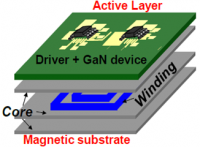Voltage Regulator Chip

Technology Description:
The Center for Power Electronics Systems (CPES) at Virginia Tech is finding ways to save real estate on a computer's motherboard that could be used for other critical functions. Every computer processor today contains a voltage regulator that automatically maintains a constant level of electricity entering the device. These regulators contain bulky components and take up about 30% of a computer's motherboard. CPES is developing a voltage regulator that uses semiconductors made of gallium nitride on silicon (GaN-on-Si) and high-frequency soft magnetic material. These materials are integrated on a small, 3D chip that can handle the same amount of power as traditional voltage regulators at 1/10 the size and with improved efficiency. The small size also frees up to 90% of the motherboard space occupied by current voltage regulators.
Potential Impact:
If successful, CPES would help create more compact and efficient electronic devices.
Security:
This project could help ensure the U.S. continues leading the world in the development of advanced computer, telecommunication, and mobile equipment.
Environment:
This project would reduce the size of electronic devices, which in turn reduces electronic waste.
Economy:
This project could reduce computer prices for consumers, reestablish the U.S. power management integrated circuit industry as a technological leader, and stimulate further growth of other domestic information technology industries.
Contact
ARPA-E Program Director:
Dr. Timothy Heidel
Project Contact:
Qiang Li
Press and General Inquiries Email:
ARPA-E-Comms@hq.doe.gov
Project Contact Email:
lqvt@vt.edu
Partners
Enpirion, Inc.
International Rectifier
University of Delaware
Related Projects
Release Date:
03/02/2010
